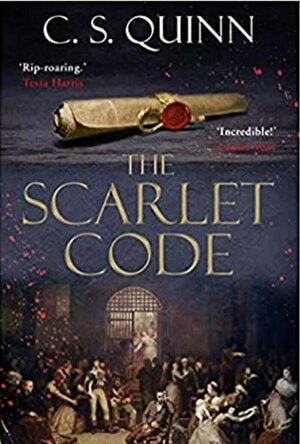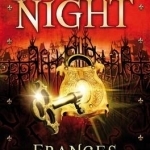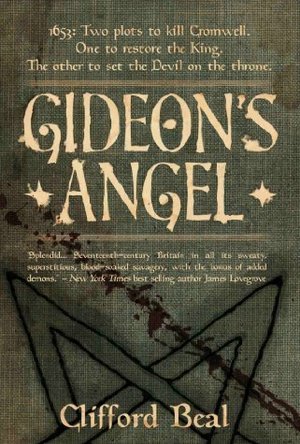Search

Margaret the First
Book
'I am as Ambitious as ever any of my Sex was, is, or can be; though I cannot be Henry the Fifth, or...
ClareR (6054 KP) rated The Scarlet Code in Books
Aug 23, 2020
These books must surely at least make it on to TV? They read like a film - I absolutely love them! I don’t know whether there were all-action, female spies around this time (I know there were female spies during the time just after the English Civil War, so why would they stop?), and frankly, I don’t much care. Well, I do, but what I’m hoping to get across here, is how much I LOVED this book! It’s rich in historical detail, the character development is equally good.
I’m really enjoying following Attica Morgan’s exploits (see what I did there? That’s not even a hint that I want more, that’s a “let there be more!”). Attica’s love of Paris, even at this really uncertain time between the fall of the Bastille and the actual start of the Revolution, is so well described that I felt that I could be there. I love a book where I can learn something. I’d always thought that the people released the prisoners from the Bastille (or in fact they didn’t, because it was virtually empty - or so I’ve been told), and then BAM! Voila la Révolution française! Well, by the sounds of it there was a bit of a tense hiatus between one thing and the next (we won’t discuss the fact that I was a French teacher in a former life - sshh!).
Anyway, if you enjoy a well written, historical romp, with an opinionated, strong female lead character - then this is the book for you! I can’t wait for the next one (not even hinting)!!
Many thanks to Readers First for sending me a copy of this book.
I’m really enjoying following Attica Morgan’s exploits (see what I did there? That’s not even a hint that I want more, that’s a “let there be more!”). Attica’s love of Paris, even at this really uncertain time between the fall of the Bastille and the actual start of the Revolution, is so well described that I felt that I could be there. I love a book where I can learn something. I’d always thought that the people released the prisoners from the Bastille (or in fact they didn’t, because it was virtually empty - or so I’ve been told), and then BAM! Voila la Révolution française! Well, by the sounds of it there was a bit of a tense hiatus between one thing and the next (we won’t discuss the fact that I was a French teacher in a former life - sshh!).
Anyway, if you enjoy a well written, historical romp, with an opinionated, strong female lead character - then this is the book for you! I can’t wait for the next one (not even hinting)!!
Many thanks to Readers First for sending me a copy of this book.
Lyndsey Gollogly (2893 KP) rated Fly by Night in Books
Jun 17, 2024
116 of 220
Kindle
Fly by Night ( Book 1)
By Frances Hardinge
⭐️⭐️⭐️⭐️
A fantastic adventure story set in an alternative historical world that launches the career of a uniquely talented children's writer. In a fractured Realm, struggling to maintain an uneasy peace after years of civil war and religious tyrrany, a 12- year- old orphan and a homicidal goose become the accidental heroes of a revolution. Mosca has spent her life in a miserable hamlet, where her father was banished for writing inflammatory books about tolerance and freedom. Now he is dead, and Mosca is on the run after unintentionally setting fire to a mill. With a delightful swindler named Eponymous Clent, she heads for the city of Mandelion. A born liar, Mosca lives by her wits in a world of highwaymen and smugglers, dangerously insane rulers in ludicrous wigs, secret agents and radical plotters. She is recruited as a spy by the fanatical Mabwick Toke, leader of the Guild of Stationers, who fears losing his control over the publication of every book in the state. Mosca's activities reveal a plot to force a rule of terror on the Realm, and merry mayhem soon leads to murder..
I really enjoyed this. A girl trying to escape her fate she releases a prisoner and becomes his aide this is a full adventure for her and as she goes she learns a lot about herself and who to trust. It’s a hard road for Mosca but she has her pet goose to help her through. It’s a quirky world inspired by English history. Where books are dangerous.
Kindle
Fly by Night ( Book 1)
By Frances Hardinge
⭐️⭐️⭐️⭐️
A fantastic adventure story set in an alternative historical world that launches the career of a uniquely talented children's writer. In a fractured Realm, struggling to maintain an uneasy peace after years of civil war and religious tyrrany, a 12- year- old orphan and a homicidal goose become the accidental heroes of a revolution. Mosca has spent her life in a miserable hamlet, where her father was banished for writing inflammatory books about tolerance and freedom. Now he is dead, and Mosca is on the run after unintentionally setting fire to a mill. With a delightful swindler named Eponymous Clent, she heads for the city of Mandelion. A born liar, Mosca lives by her wits in a world of highwaymen and smugglers, dangerously insane rulers in ludicrous wigs, secret agents and radical plotters. She is recruited as a spy by the fanatical Mabwick Toke, leader of the Guild of Stationers, who fears losing his control over the publication of every book in the state. Mosca's activities reveal a plot to force a rule of terror on the Realm, and merry mayhem soon leads to murder..
I really enjoyed this. A girl trying to escape her fate she releases a prisoner and becomes his aide this is a full adventure for her and as she goes she learns a lot about herself and who to trust. It’s a hard road for Mosca but she has her pet goose to help her through. It’s a quirky world inspired by English history. Where books are dangerous.
FG
From Guernica to Greatness: Eighty Years of Los Rojos
Book
Nowadays, the Premier League is increasingly dominated by Spanish stars, from David Silva to David...

Holiday Destination by Nadine Shah
Album Watch
For most of us, 2016 was a tumultuous and ugly year - one steeped in political chaos and an air of...
rock pop

Walden by Henry David Thoreau
Podcast
Two years, two months and two days! This is what forms the time line of one man's quest for the...
BankofMarquis (1832 KP) rated Parallel Mothers (2021) in Movies
Mar 21, 2022
Cruz is terrific, the "B" plot is better
I have stated before that I find that Penelope Cruz is a very good (not great) actress when working in English. But…she has been a revelation to me as a GREAT Actress when I catch her work in her native language, Spanish, and she is especially good when she is working in a piece by the man that calls her his “muse”, Writer/Director Pedro Almodovar.
Such is the case with their latest collaboration - PARALLEL MOTHERS - an interesting and engaging film with a quality performance at the center of it by Cruz, a performance that has her, rightfully, nominated for the 4th time for an Oscar (she won in 2008 for her Supporting Role in VICKY CHRISTINA BARCELONA).
In this film, Cruz stars as one of 2 “parallel mothers”, who’s character, Janis, goes into labor at the same time as Milena Smit’s character, Ana. What happens to these two is that their lives will be intertwined in such a way that these “parallel mothers” will have a connection for the rest of their lives.
But, this is just the “A” story of this film and (as has been his custom), Almodovar gives us a “B” story that focuses on Spain’s attempt to continue to heal from the Spanish Civil War - and it is this part of the film that is the part that has lingered with me.
Cruz, of course, is a beautiful, wonderful choice as Janis. She holds the screen in every scene she is in (and that is almost every one) and her and Almodovar know what kind of movie they are making and head strongly in that direction. The surprise for me was Milena Smit’s performance as Ana as she holds her own in her scenes with Cruz.
The “A” story of this film is good (but not great) and it does fall, a bit, into “Soap Opera” territory, but Almodovar, Cruz et al know how to elevate it above that with realistic dialogue and emotions that grounds this portion of the film. It is the “B” plot that Almodovar seems to be more interested in and this, in turn, makes that part of the story the more interesting one. To be fair to Cruz, it does involve her character as well, but her relationship with Ana is put in the background, thus negating that relationship to the importance of the story.
The “B” plot was better and I almost wish that this was the main part of the story, it might have made it an overall better - maybe even excellent - film, but, instead, PARALLEL MOTHERS falls to “just” VERY GOOD.
Letter Grade: A- (for Cruz’ and Smit’s performances and the “B” plot)
8 stars (out of 10) and you can take that to the Bank(ofMarquis)
Such is the case with their latest collaboration - PARALLEL MOTHERS - an interesting and engaging film with a quality performance at the center of it by Cruz, a performance that has her, rightfully, nominated for the 4th time for an Oscar (she won in 2008 for her Supporting Role in VICKY CHRISTINA BARCELONA).
In this film, Cruz stars as one of 2 “parallel mothers”, who’s character, Janis, goes into labor at the same time as Milena Smit’s character, Ana. What happens to these two is that their lives will be intertwined in such a way that these “parallel mothers” will have a connection for the rest of their lives.
But, this is just the “A” story of this film and (as has been his custom), Almodovar gives us a “B” story that focuses on Spain’s attempt to continue to heal from the Spanish Civil War - and it is this part of the film that is the part that has lingered with me.
Cruz, of course, is a beautiful, wonderful choice as Janis. She holds the screen in every scene she is in (and that is almost every one) and her and Almodovar know what kind of movie they are making and head strongly in that direction. The surprise for me was Milena Smit’s performance as Ana as she holds her own in her scenes with Cruz.
The “A” story of this film is good (but not great) and it does fall, a bit, into “Soap Opera” territory, but Almodovar, Cruz et al know how to elevate it above that with realistic dialogue and emotions that grounds this portion of the film. It is the “B” plot that Almodovar seems to be more interested in and this, in turn, makes that part of the story the more interesting one. To be fair to Cruz, it does involve her character as well, but her relationship with Ana is put in the background, thus negating that relationship to the importance of the story.
The “B” plot was better and I almost wish that this was the main part of the story, it might have made it an overall better - maybe even excellent - film, but, instead, PARALLEL MOTHERS falls to “just” VERY GOOD.
Letter Grade: A- (for Cruz’ and Smit’s performances and the “B” plot)
8 stars (out of 10) and you can take that to the Bank(ofMarquis)
Zuky the BookBum (15 KP) rated The Witchfinder's Sister in Books
Mar 15, 2018
<i><b>I think now that to be close to someone can be to underestimate them. Grow too close, and you do not see what they are capable of; or you do not see it in time.</b></i>
<i>The Witchfinder’s Sister</i> is based on true life witch hunter Matthew Hopkins that grew to fame during the English Civil War around East Anglia, hunting and killing “witches”. This book isn’t non-fiction, it’s fiction based around non-fiction! I love these sorts of books that create their own stories from something that was very much real. Not only does it make for good reading, they also bring in some true history facts, so you’re being educated on the subject as you read.
High praise goes to Underdown for this novel. I feel like historical fiction can be hard genre to get right, and considering this is a <i>debut</i> novel, I’m amazed at how well put together and beautiful this has turned out to be! I love reading historical fiction, every once in awhile, and this is the sort of book that keeps my love for the genre burning.
The writing in this novel was haunting and beautiful. Nine times out of ten, it was exactly as you would have imagined the 17th Century to be, but I felt there were a few slips that made the book feel modern. For example, would a lady in 1645 say the phrase <i><b>“shitting herself”</b></i>? Correct me if I’m wrong, but that feels like a reasonably modern phrase to me.
I loved our main character, Alice. Me and my mum were talking about historical fiction novels and how we find it hard to understand why women make the decisions they make in these books, because we’re so used to having some equality and independence. But I noted that in this book, even though Alice is inferior to her brother and his counterparts, she is still a risk taker; going against her brother's wishes & sneaking around. I liked that she was strong and a little rebellious, it was so much easier to connect with her because of this.
On the other hand. I <i>hated</i> Matthew. He was a despicable character. I can rarely hate a character in a book, even if I’m supposed to. I tend to find the good in them at some point, or have some sort of sympathy for them, but I absolutely despised Matthew. Well done to Underdown for creating such a hate-inducing character. It’s quite a hard feat, but she managed it perfectly. The same goes for Mary Phillips.
The tension was built so well in this novel, you could feel the mystery growing and growing with every page and I loved it! Though the story moved reasonably slowly, the book was still absolutely riveting and I found it extremely hard to put down when I knew it was time to get some rest.
I am so, so excited to read more from Underdown. This was an amazingly well put together and researched.
<i>Thanks to Netgalley and Penguin Books UK for giving me the opportunity to read this in exchange for an honest review.</i>
<i>The Witchfinder’s Sister</i> is based on true life witch hunter Matthew Hopkins that grew to fame during the English Civil War around East Anglia, hunting and killing “witches”. This book isn’t non-fiction, it’s fiction based around non-fiction! I love these sorts of books that create their own stories from something that was very much real. Not only does it make for good reading, they also bring in some true history facts, so you’re being educated on the subject as you read.
High praise goes to Underdown for this novel. I feel like historical fiction can be hard genre to get right, and considering this is a <i>debut</i> novel, I’m amazed at how well put together and beautiful this has turned out to be! I love reading historical fiction, every once in awhile, and this is the sort of book that keeps my love for the genre burning.
The writing in this novel was haunting and beautiful. Nine times out of ten, it was exactly as you would have imagined the 17th Century to be, but I felt there were a few slips that made the book feel modern. For example, would a lady in 1645 say the phrase <i><b>“shitting herself”</b></i>? Correct me if I’m wrong, but that feels like a reasonably modern phrase to me.
I loved our main character, Alice. Me and my mum were talking about historical fiction novels and how we find it hard to understand why women make the decisions they make in these books, because we’re so used to having some equality and independence. But I noted that in this book, even though Alice is inferior to her brother and his counterparts, she is still a risk taker; going against her brother's wishes & sneaking around. I liked that she was strong and a little rebellious, it was so much easier to connect with her because of this.
On the other hand. I <i>hated</i> Matthew. He was a despicable character. I can rarely hate a character in a book, even if I’m supposed to. I tend to find the good in them at some point, or have some sort of sympathy for them, but I absolutely despised Matthew. Well done to Underdown for creating such a hate-inducing character. It’s quite a hard feat, but she managed it perfectly. The same goes for Mary Phillips.
The tension was built so well in this novel, you could feel the mystery growing and growing with every page and I loved it! Though the story moved reasonably slowly, the book was still absolutely riveting and I found it extremely hard to put down when I knew it was time to get some rest.
I am so, so excited to read more from Underdown. This was an amazingly well put together and researched.
<i>Thanks to Netgalley and Penguin Books UK for giving me the opportunity to read this in exchange for an honest review.</i>
Gareth von Kallenbach (980 KP) rated Jimmy's Hall (2015) in Movies
Aug 6, 2019
It’s not to often that we folks in America have the opportunity to catch any movies from Ireland.
The few that do come along almost certainly rate high on the scale of exceptional movies that one would want to see. I myself can’t remember a ‘bad’ Irish film. Perhaps one of the reasons for that is the fact that this country has a solid history of countless Irish immigrants coming here and helping to build the foundations for America. Well, today’s film for your consideration doesn’t go back THAT far. It doesn’t even take place in America. However, the history of Irish immigrants (specifically one immigrant) does play a role. Only it involves an Irish immigrant how came to America and then several years later returned to Ireland only to be forcibly deported back to America. I know I know. That explanation makes it sound like a comedy and although the film has many lighthearted moments, I can assure you it’s NOT a comedy. In fact, it deals with an influential figure in one of the more politically turbulent periods in Ireland’s history just before the beginning of the Second World War.
‘Jimmy’s Hall’ is a 2014 Irish-British drama directed by English television and film director Kenneth ‘Ken’ Loach. The film focuses on the events leading up to the deportation from Ireland of Jimmy Gralton, who led a precursor to Ireland’s communist party in the county Leitrim.
Starring Barry Ward, Simone Kirby, and Irish character actor Jim Norton, the film opens in 1932. Jimmy (Ward) has just returned to his home to help his mother tend the family farm after spending 10 years in the United States in the midst of the Great Depression coinciding with the establishment of a new government in the aftermath of the Civil War between pro-British and anti-British forces.
Reluctant to anger his old enemies, the church and the landowners who forced him to leave Ireland, but eager to meet the needs of the people of Leitrim, Jimmy (Ward) decides to reopen the ‘Hall’, a center for young people where they can meet to study, talk, dance, play music, learn to read, debate issues of the day. Free to all and open to anyone who wishes to learn while respecting the views and opinions of others, the ‘Hall’ is an immediate success. Not everyone is pleased to see Jimmy resuming his old activities. In particular the church and local priest (Norton) who see Gralton as not only a ‘bad influence’, but also as a follower of Stalin who as history knows sent countless millions (including religious leaders) to their deaths.
Despite the complaints and at times violent reactions on the part of the supporters of the church and the landowners, Gralton tries desperately to make them realize he has absolutely no connection to Stalin and has no desire to bring down the church. Only to better the situation for everyone. Jimmy even invites the local priest to take a leadership role in the Hall’s committee. In the end though, the fears of the church and the state go unchanged. Jimmy is a communist and although he has no connection Stalin the church and the government see them as one in the same. The police take Jimmy into custody at his family’s farm and forcibly deport him back to America even so much as denying him on last chance to see his ailing mother.
In education systems there are books and films which are considered ‘required reading’ or in this case ‘required viewing’. This film should be required viewing. It is not just an excellent film about a historical Irish political figure or as I mentioned earlier a film about a turbulent point in Irish history. It’s an example of the greater ‘world conflict’ between what became the western bloc and the eastern bloc. Both sides in that grater conflict saw each other the same way the two sides in the Irish countryside of the 1930s saw each other. The ones that meant well and only wanted to better the situation for everyone including themselves inspired fear in those who had power and those who had the power inspired fear in those who meant well. This movie showed that not all political figures are evil … nor are all religious figures. It’s the individual or several individuals within those groups that are reluctant to change.
I would highly recommend this film. Regardless of the content it’s an excellent film. If this film is as good as most films made in Ireland, they definitely need to start exporting them on a grander scale. I’d give this film 4 out of 5 stars.
This is your friendly neighborhood photographer ‘The CameraMan’ and on behalf of my fellows at ‘Skewed & Reviewed’ I’d like to say thanks for reading and we’ll see you at the movies
The few that do come along almost certainly rate high on the scale of exceptional movies that one would want to see. I myself can’t remember a ‘bad’ Irish film. Perhaps one of the reasons for that is the fact that this country has a solid history of countless Irish immigrants coming here and helping to build the foundations for America. Well, today’s film for your consideration doesn’t go back THAT far. It doesn’t even take place in America. However, the history of Irish immigrants (specifically one immigrant) does play a role. Only it involves an Irish immigrant how came to America and then several years later returned to Ireland only to be forcibly deported back to America. I know I know. That explanation makes it sound like a comedy and although the film has many lighthearted moments, I can assure you it’s NOT a comedy. In fact, it deals with an influential figure in one of the more politically turbulent periods in Ireland’s history just before the beginning of the Second World War.
‘Jimmy’s Hall’ is a 2014 Irish-British drama directed by English television and film director Kenneth ‘Ken’ Loach. The film focuses on the events leading up to the deportation from Ireland of Jimmy Gralton, who led a precursor to Ireland’s communist party in the county Leitrim.
Starring Barry Ward, Simone Kirby, and Irish character actor Jim Norton, the film opens in 1932. Jimmy (Ward) has just returned to his home to help his mother tend the family farm after spending 10 years in the United States in the midst of the Great Depression coinciding with the establishment of a new government in the aftermath of the Civil War between pro-British and anti-British forces.
Reluctant to anger his old enemies, the church and the landowners who forced him to leave Ireland, but eager to meet the needs of the people of Leitrim, Jimmy (Ward) decides to reopen the ‘Hall’, a center for young people where they can meet to study, talk, dance, play music, learn to read, debate issues of the day. Free to all and open to anyone who wishes to learn while respecting the views and opinions of others, the ‘Hall’ is an immediate success. Not everyone is pleased to see Jimmy resuming his old activities. In particular the church and local priest (Norton) who see Gralton as not only a ‘bad influence’, but also as a follower of Stalin who as history knows sent countless millions (including religious leaders) to their deaths.
Despite the complaints and at times violent reactions on the part of the supporters of the church and the landowners, Gralton tries desperately to make them realize he has absolutely no connection to Stalin and has no desire to bring down the church. Only to better the situation for everyone. Jimmy even invites the local priest to take a leadership role in the Hall’s committee. In the end though, the fears of the church and the state go unchanged. Jimmy is a communist and although he has no connection Stalin the church and the government see them as one in the same. The police take Jimmy into custody at his family’s farm and forcibly deport him back to America even so much as denying him on last chance to see his ailing mother.
In education systems there are books and films which are considered ‘required reading’ or in this case ‘required viewing’. This film should be required viewing. It is not just an excellent film about a historical Irish political figure or as I mentioned earlier a film about a turbulent point in Irish history. It’s an example of the greater ‘world conflict’ between what became the western bloc and the eastern bloc. Both sides in that grater conflict saw each other the same way the two sides in the Irish countryside of the 1930s saw each other. The ones that meant well and only wanted to better the situation for everyone including themselves inspired fear in those who had power and those who had the power inspired fear in those who meant well. This movie showed that not all political figures are evil … nor are all religious figures. It’s the individual or several individuals within those groups that are reluctant to change.
I would highly recommend this film. Regardless of the content it’s an excellent film. If this film is as good as most films made in Ireland, they definitely need to start exporting them on a grander scale. I’d give this film 4 out of 5 stars.
This is your friendly neighborhood photographer ‘The CameraMan’ and on behalf of my fellows at ‘Skewed & Reviewed’ I’d like to say thanks for reading and we’ll see you at the movies
Jordan Binkerd (567 KP) rated Gideon's Angel in Books
Aug 15, 2019
Note: this review is transposted from my personal review blog, and so was originally written several years ago. I figured if I reposted it here, someone might actually read it….
I received my copy of Gideon’s Angel through the Goodreads FirstReads program. This in no way influences my review, except to ensure that I was able to get ahold of this book and thus review it. I have to say, I really enjoyed this one. I want to describe it as “steampunk,” but my understanding is that steampunk is usually set in the 1800s (or at least that level of tech and society) whereas this work is firmly set in 1653. If there’s already a term for pseudo-historical fiction with a fantasy touch set in that timeframe, I apologize for not knowing what it is and using it accordingly.
Things are not going well for Richard Treadwell. The English Civil War is over, the King’s Cavaliers lost to the forces of Parliament and Oliver Cromwell, and Charles I has been executed. Treadwell has managed to escape the destruction of his cause, and has spent the past eight years in exile in France, performing a delicate balancing act between loyalty to his exiled king* and his employer, Cardinal Mazarin. When Mazarin informs him that someone is using the forces of Hell to tip the balance in their favor and asks him to spy on the exile court to find out if it is one of the king’s supporters, Treadwell decides that it’s time to get out of Paris. He accepts a mission for one of the king’s more militant supporters that will take him back to his beloved England–to lead a Royalist uprising, one last try to oust Cromwell and his Puritan cronies. Treadwell has other business to tend to as well, including a wife who by now probably considers herself a widow. Unfortunately for Treadwell’s simple worldview, it soon becomes clear that Cromwell’s power is the only thing preventing the more radical Puritan elements from running roughshod over the whole country. Worse still, a demon from the pits of Hell has appeared to a radical Puritan sect masquerading as an angel of light and ordering the death of Cromwell so that the Kingdom of God may be fulfilled. Now instead of assassinating Cromwell Treadwell will be forced to save him–if he can find a way to fight the forces of Hell, gain some allies in his quest, and avoid d’Artagnan, a young Musketeer dispatched by the Cardinal to bear him back to Paris….
I really enjoyed this book. It’s not exactly “high literature,” but I think I’ve very well established that I care far more about a work’s entertainment value than whatever it is critics look for. The world Beal creates here feels very real, slipping in background historical information without making you feel like you’ve been lectured. Some readers will probably wish for more background on the English Civil War, and that’s fine. If they care that much, there are numerous good books on the subject. If they don’t, there’s a Wikipedia article that should give you a good rundown on what happened. Beal manages to evoke seventeenth-century London in all its grimy glory, much as it would have actually been aside from the fact that all the magic we dismiss as superstition is actually going on behind the scenes. Moreover, this magic very much resembles what you would find depicted in the folklore of the era without obvious modern embellishment. I’m not really all that well versed in the history of the Freemasons, so I can’t accurately speak to how they were portrayed here except to say that I very much doubt their claim to date back to the builders of the pyramids. Then again, I doubt they have the tools to summon demons too, so maybe I shouldn’t be too critical. Secondary characters generally proved to be interestingly complex, especially Billy Chard, but I am seeing criticism of how the female characters in the book act. They aren’t weak characters by any means, but they are constrained by their roles in society. Treadwell’s wife has pragmatically joined her fate to that of the officer who took over Treadwell’s land when he was banished and is pregnant with his child. Is she weak for this? Or is she a strong female doing what she has to in order to protect what is left of her family? Treadwell’s Parisian mistress follows him to England rather than stay in Paris and face the scandal of their liasion alone. Weak, for needing Treadwell by her side? Or strong, for following him into whatever dangers he may be facing? Finally, Isabelle decides to follow her father and the rest of Treadwell’s band into battle against the forces of Darkness, deciding that it would be better to fall by his side than live on without him. Possibly a sign of weakness, but look at her situation realistically. She and her father were driven from Spain for their Jewish heritage, her mother dying along the way. Jews do not fare well in the Christian world of the seventeenth century, not even in England. The lot of a young woman alone in the world is already hard enough in this time without adding the burden of religious and ethnic persecution. She would have no respectable means of supporting herself, and could conceivably find herself forced into prostitution–on her own if she was lucky, as no more than a slave if she was not. Is preferring death in battle to such a fate a sign of weakness or of strength? She certainly has no trouble speaking her mind, and in fact berates Treadwell severely for endangering her father when they first meet. I suppose I can understand where some people would find these characters and their portrayal to be weak and sexist, but I respectfully disagree. I submit that instead they are strong characters reacting realistically to a world where women are not treated equally–in fact, I would have more of a problem with them if they demonstrated anachronistic modern sensibilities.** The ending was a little deus ex machina, but on the whole I didn’t mind. I would say that I want to read a sequel, but I don’t think the author could come up with anything to top this in terms of personal impact on the characters–Treadwell’s internal conflict between hating Cromwell and having to save him is very well done, and I fear Beal would prove unable to find something equally interesting as a follow up. We never really got to find out what happened to Treadwell back during the Thirty Years War that introduced him to the world of angels and demons, so I could see maybe writing that up….I’d buy it, anyway.
CONTENT: R-rated language, occasionally harsh but I would argue not gratuitous. Moderately explicit sexual content, as you would expect from a work in this vein.*** A fair amount of violence, from both man and demon. Not usually too gory in its description. There is also a good deal of occult content, as the villains are summoning a demon they believe to be an angel. This demon’s lesser minions dog Treadwell and his friends, and there are multiple encounters with them. One is implied to be a golem, others appear as strange amalgamations of beast(s) and man. For me, this is adequately balanced by the recognition that, as powerful as the forces of Darkness are, God is far more powerful than they. Bottom line: if you’re mature enough to handle the other content, I don’t believe the occult elements should prove to be an issue.
*Charles I was executed, while his son Charles II went into exile. Just in case you were concerned with the historical accuracy of the book. So far as I can tell, this is pretty accurate. You know, aside from the demons and fictional characters roaming London…..
**Please understand, I’m neither defending nor endorsing the inequality of the seventeenth century. Neither is Clifford Beal, for that matter. I’m simply pointing out that it was how it was, and this was the world the characters would have come from. I’m all for equality, but to whitewash history and pretend it was different from it was….that way lies dangerous waters.
***This evokes more than anything a supernatural-tinged Alexandre Dumas novel for me….and you know how bawdry his musketeers could be when they wanted to be.
Original post: https://jordanbinkerd.wordpress.com/2013/10/24/review-gideons-angel-by-clifford-beal/
I received my copy of Gideon’s Angel through the Goodreads FirstReads program. This in no way influences my review, except to ensure that I was able to get ahold of this book and thus review it. I have to say, I really enjoyed this one. I want to describe it as “steampunk,” but my understanding is that steampunk is usually set in the 1800s (or at least that level of tech and society) whereas this work is firmly set in 1653. If there’s already a term for pseudo-historical fiction with a fantasy touch set in that timeframe, I apologize for not knowing what it is and using it accordingly.
Things are not going well for Richard Treadwell. The English Civil War is over, the King’s Cavaliers lost to the forces of Parliament and Oliver Cromwell, and Charles I has been executed. Treadwell has managed to escape the destruction of his cause, and has spent the past eight years in exile in France, performing a delicate balancing act between loyalty to his exiled king* and his employer, Cardinal Mazarin. When Mazarin informs him that someone is using the forces of Hell to tip the balance in their favor and asks him to spy on the exile court to find out if it is one of the king’s supporters, Treadwell decides that it’s time to get out of Paris. He accepts a mission for one of the king’s more militant supporters that will take him back to his beloved England–to lead a Royalist uprising, one last try to oust Cromwell and his Puritan cronies. Treadwell has other business to tend to as well, including a wife who by now probably considers herself a widow. Unfortunately for Treadwell’s simple worldview, it soon becomes clear that Cromwell’s power is the only thing preventing the more radical Puritan elements from running roughshod over the whole country. Worse still, a demon from the pits of Hell has appeared to a radical Puritan sect masquerading as an angel of light and ordering the death of Cromwell so that the Kingdom of God may be fulfilled. Now instead of assassinating Cromwell Treadwell will be forced to save him–if he can find a way to fight the forces of Hell, gain some allies in his quest, and avoid d’Artagnan, a young Musketeer dispatched by the Cardinal to bear him back to Paris….
I really enjoyed this book. It’s not exactly “high literature,” but I think I’ve very well established that I care far more about a work’s entertainment value than whatever it is critics look for. The world Beal creates here feels very real, slipping in background historical information without making you feel like you’ve been lectured. Some readers will probably wish for more background on the English Civil War, and that’s fine. If they care that much, there are numerous good books on the subject. If they don’t, there’s a Wikipedia article that should give you a good rundown on what happened. Beal manages to evoke seventeenth-century London in all its grimy glory, much as it would have actually been aside from the fact that all the magic we dismiss as superstition is actually going on behind the scenes. Moreover, this magic very much resembles what you would find depicted in the folklore of the era without obvious modern embellishment. I’m not really all that well versed in the history of the Freemasons, so I can’t accurately speak to how they were portrayed here except to say that I very much doubt their claim to date back to the builders of the pyramids. Then again, I doubt they have the tools to summon demons too, so maybe I shouldn’t be too critical. Secondary characters generally proved to be interestingly complex, especially Billy Chard, but I am seeing criticism of how the female characters in the book act. They aren’t weak characters by any means, but they are constrained by their roles in society. Treadwell’s wife has pragmatically joined her fate to that of the officer who took over Treadwell’s land when he was banished and is pregnant with his child. Is she weak for this? Or is she a strong female doing what she has to in order to protect what is left of her family? Treadwell’s Parisian mistress follows him to England rather than stay in Paris and face the scandal of their liasion alone. Weak, for needing Treadwell by her side? Or strong, for following him into whatever dangers he may be facing? Finally, Isabelle decides to follow her father and the rest of Treadwell’s band into battle against the forces of Darkness, deciding that it would be better to fall by his side than live on without him. Possibly a sign of weakness, but look at her situation realistically. She and her father were driven from Spain for their Jewish heritage, her mother dying along the way. Jews do not fare well in the Christian world of the seventeenth century, not even in England. The lot of a young woman alone in the world is already hard enough in this time without adding the burden of religious and ethnic persecution. She would have no respectable means of supporting herself, and could conceivably find herself forced into prostitution–on her own if she was lucky, as no more than a slave if she was not. Is preferring death in battle to such a fate a sign of weakness or of strength? She certainly has no trouble speaking her mind, and in fact berates Treadwell severely for endangering her father when they first meet. I suppose I can understand where some people would find these characters and their portrayal to be weak and sexist, but I respectfully disagree. I submit that instead they are strong characters reacting realistically to a world where women are not treated equally–in fact, I would have more of a problem with them if they demonstrated anachronistic modern sensibilities.** The ending was a little deus ex machina, but on the whole I didn’t mind. I would say that I want to read a sequel, but I don’t think the author could come up with anything to top this in terms of personal impact on the characters–Treadwell’s internal conflict between hating Cromwell and having to save him is very well done, and I fear Beal would prove unable to find something equally interesting as a follow up. We never really got to find out what happened to Treadwell back during the Thirty Years War that introduced him to the world of angels and demons, so I could see maybe writing that up….I’d buy it, anyway.
CONTENT: R-rated language, occasionally harsh but I would argue not gratuitous. Moderately explicit sexual content, as you would expect from a work in this vein.*** A fair amount of violence, from both man and demon. Not usually too gory in its description. There is also a good deal of occult content, as the villains are summoning a demon they believe to be an angel. This demon’s lesser minions dog Treadwell and his friends, and there are multiple encounters with them. One is implied to be a golem, others appear as strange amalgamations of beast(s) and man. For me, this is adequately balanced by the recognition that, as powerful as the forces of Darkness are, God is far more powerful than they. Bottom line: if you’re mature enough to handle the other content, I don’t believe the occult elements should prove to be an issue.
*Charles I was executed, while his son Charles II went into exile. Just in case you were concerned with the historical accuracy of the book. So far as I can tell, this is pretty accurate. You know, aside from the demons and fictional characters roaming London…..
**Please understand, I’m neither defending nor endorsing the inequality of the seventeenth century. Neither is Clifford Beal, for that matter. I’m simply pointing out that it was how it was, and this was the world the characters would have come from. I’m all for equality, but to whitewash history and pretend it was different from it was….that way lies dangerous waters.
***This evokes more than anything a supernatural-tinged Alexandre Dumas novel for me….and you know how bawdry his musketeers could be when they wanted to be.
Original post: https://jordanbinkerd.wordpress.com/2013/10/24/review-gideons-angel-by-clifford-beal/






